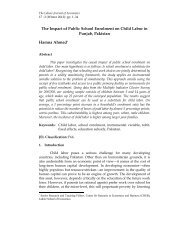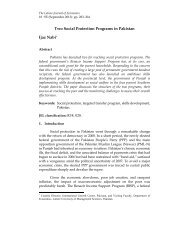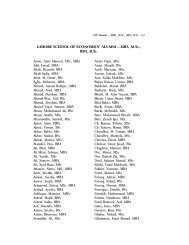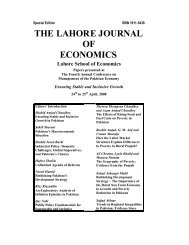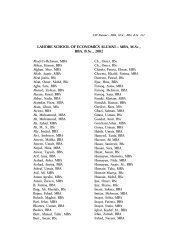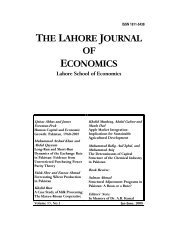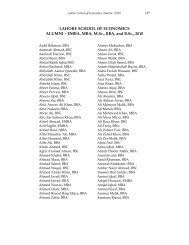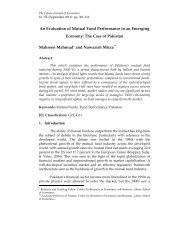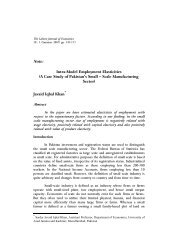Special Edition-07.pdf - Lahore School of Economics
Special Edition-07.pdf - Lahore School of Economics
Special Edition-07.pdf - Lahore School of Economics
Create successful ePaper yourself
Turn your PDF publications into a flip-book with our unique Google optimized e-Paper software.
Reforming the Government in Pakistan: Rationale, Principles & Proposed Approach 7<br />
Seventh, the switch over from manual to automated processes and<br />
the government’s commitment to move towards E-Government would<br />
require a look at the skill mix and training requirements <strong>of</strong> the existing and<br />
future civil servants throughout the entire hierarchy. E-Government will<br />
itself flatten the hierarchical texture and make apparent the redundancies in<br />
the system. At the same time it will involve basic computer literacy at all<br />
levels and grades, digital archiving, storage and retrieval <strong>of</strong> all files and<br />
documents. Consequently, only a few <strong>of</strong> the clerical and subordinate staff<br />
positions can be utilized in the future government organization.<br />
(D) Expectations-Delivery Gap<br />
The recent political history <strong>of</strong> South Asia clearly points to the failure<br />
<strong>of</strong> successive governments to live up to the expectations <strong>of</strong> the majority <strong>of</strong><br />
their population. This trend has become even more acute in the last decade<br />
or so with the advent and spread <strong>of</strong> the electronic media. Although all the<br />
countries in the region have performed well and attained respectable rates<br />
<strong>of</strong> economic growth, yet every incumbent government has been voted out <strong>of</strong><br />
power at the time <strong>of</strong> elections. The benefits <strong>of</strong> growth may have filtered<br />
down but the speed and their distribution have not been able to satisfy the<br />
electorate. The ICT (Information Communication Technology) revolution<br />
that has touched even the remote areas <strong>of</strong> these countries has, in fact,<br />
tended to exaggerate the disparities and contributed to higher expectations<br />
<strong>of</strong> government. On the one hand, the capacity <strong>of</strong> the government<br />
institutions responsible for the delivery <strong>of</strong> public goods and services has<br />
rapidly eroded and is in a debilitating and feeble state, while a large variety<br />
<strong>of</strong> goods and services available, advertised and visually observed on the<br />
electronic media has whetted their appetite. They believe that the means<br />
through which they can acquire these goods and services for themselves and<br />
their children is through public sector employment, education and training<br />
and government transfers. In actual practice, the allocation <strong>of</strong> public goods,<br />
services, employment and subsidies is rationed by access to the government<br />
functionaries or by paying bribes. As these groups have neither the access<br />
nor the money to pay the bribes, they suffer from a relative sense <strong>of</strong><br />
deprivation while observing that the influential and well-to-do segments <strong>of</strong><br />
the population are preempting and enjoying the benefits <strong>of</strong> government<br />
jobs, contracts, permits, land, etc. Large, untaxed incomes are also accruing<br />
to the same privileged groups and individuals. The resentment <strong>of</strong> this poor<br />
and unconnected population is conveyed through the only instrument they<br />
possess i.e. the vote at the time <strong>of</strong> elections. This gap between expectations<br />
and delivery is one <strong>of</strong> the biggest challenges for Pakistan too.



